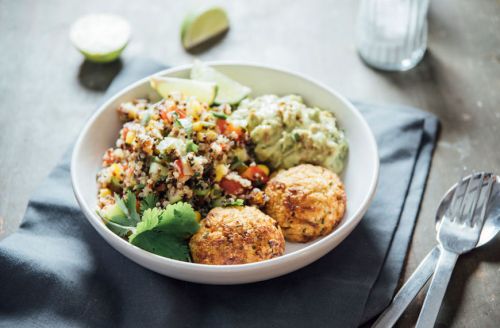Following a vegan Mediterranean diet is totally possible if you remember these 3 guidelines
Following the Mediterranean diet when you're vegan is easier than you think. Here, a nutritionist shares her tips for doing it the healthy way.

Hot take: The Mediterranean diet is basically Taylor Swift circa “You Belong With Me.” Trendy eating plans like keto are the short skirt-wearing cheer captains in this scenario, while the Med diet is definitely wearing t-shirts and sitting in the bleachers. It’s been here all along, and (this is where my Swift analogy ends) it comes with a laundry list of science-backed benefits. So even if it’s not always at the top of mind, the Mediterranean diet will, to quoth Swift again from a different song, never go out of style.
When I think of a typical meal on the Med diet, I imagine just like, a ton of salmon. So following a Mediterranean-style ethos when you’re also vegan may not seem particularly intuitive. But lo! It actually makes a ton of sense. “The Mediterranean diet is a great plan to follow if you’re vegan since the diet focuses mostly on plants, whole grains, fruits, and vegetables anyway,” says Rachel Berman, RD, general manager at Verywell. That’s because the popular eating plan is “more of a lifestyle than a diet, just like being vegan is,” she says. “It’s all about enjoying your food, paying attention to your hunger and fullness cues, and eating a variety of locally sourced wholesome foods.”
That said, there are some things you should keep in mind when trying to combine the two eating plans. Here, Berman breaks down how to successfully follow a vegan Mediterranean diet.
1. Prioritize omega-3 fatty acids
Omega-3 fatty acids are an important part of any healthy eating plan; they’re amazing for your brain, and can improve the look and health of your skin. But they are especially emphasized on a Med diet. Here’s where it gets tricky for vegans: Fish, one of the richest sources of these fatty acids, are obviously off the table.
Thankfully, you still can get enough of these crucial fatty acids if you eat the right foods. “There are three main types of omega-3s: ALA, EPA, and DHA. ALA is mostly found in plants, and EPA and DHA are found in fish,” Berman explains. Your body converts ALAs to DHAs (the gold standard of omega-3 fatty acids) but it’s not a particularly efficient process. While Berman notes that most people eat about one to two grams of ALA per day, “ALA is not as well-absorbed as the type that comes from animal sources,” she says, meaning vegans might need to eat more. “But research is mixed on the exact amount that is beneficial so would consult with your doctor before trying a supplement,” she adds.
She recommends eating foods like flaxseed, chia, walnuts, and tofu to hit your ALA quota. Plus, she notes, those foods are also good sources of protein.
Want more intel on the Mediterranean diet? You’ve come to the right place:
2. Be smart about vitamin and protein intake
The Med diet isn’t restrictive, like some other plans (cough keto cough), and there are a lot of vegan options that fit within the plan’s framework. “Definitely make sure you’re eating protein and omega-3 sources at each meal to stay satisfied and get the nutrients you need,” Berman says. That can come from beans, whole grains like quinoa, nuts, seeds, and other vegetarian protein foods. (Check out this list of vegetarian meat alternatives for more ideas.) “In addition, vegans need calcium from sources like green, leafy veggies, sesame seeds, and tahini.”
“As with any vegan diet, you also need to ensure you’re getting enough of vitamin B12, which isn’t present in plants,” Berman adds. You can do this through fortified cereal, she says, or a supplement—she recommends talking to your doctor to figure out the best option for you.
3. Go for variety
“A well-rounded Mediterranean plate has protein, fat, and fiber,” Berman says. “Breakfast could be a savory oatmeal or other whole grain with nuts or even hummus, whole wheat pita, and veggies.” Lunch could look like a bean salad with olive oil, parsley, and couscous, while dinner could be something like tofu, spinach, and quinoa with fresh fruit for dessert.
Generally, the concerns one would have on a vegan Mediterranean diet aren’t any different than what you’d already have if you were going totally plant-based: prioritize important nutrients that are hard to obtain from plant sources, and don’t rely too much on processed foods. “The more variety the better, and the Mediterranean diet allows for a rich sampling of plant based foods so vegans can get the nutrition they need,” Berman says. Seems like a pretty decent way to go if you’re looking to embrace the plant-based life.
Here, a nutritionist breaks down if nutritional yeast—aka your favorite vegan cheese alternative—is actually healthy. And these vegan Instant Pot recipes will make your life so much easier.
Sign Up for Our Daily Newsletter
Get all the latest in wellness, trends, food, fitness, beauty, and more delivered right to your inbox.
Got it, you've been added to our email list.










